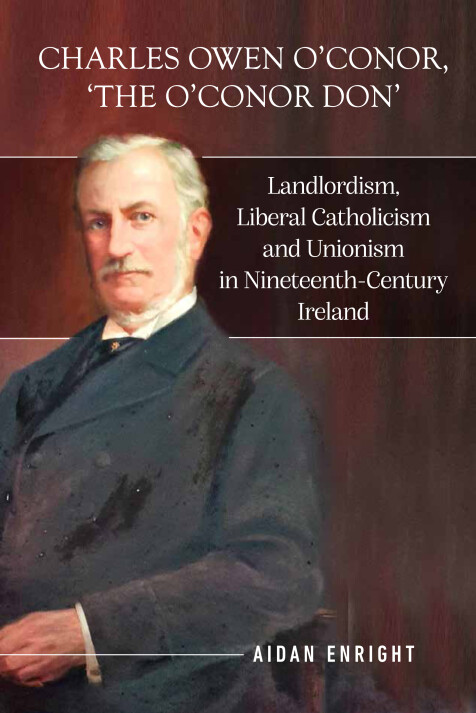Charles Owen O’Conor, the O’Conor Don
Landlordism, liberal Catholicism and unionism in nineteenth-century Ireland
Aidan Enright
"This book ... offers a meticulously researched and thoughtful account of the career of Charles Owen O'Conor." A.P.W. Malcomson, Familia, Ulster Genealogical Review Number 39, 2023
“Enright’s political biography successfully departs from the conventional chronological structure in favor of a thematic approach. He draws heavily on the O’Conor papers, one of Ireland’s largest and most significant privately held archives. Enright concentrates on themes that were the dominant features of the O’Conor Don’s life: family, estate management, landlord-tenant relations, land reform, education reform, and Home Rule ... his claim that studying such a career might help us better understand the complexities of Irish, Northern Irish and British identities today is bold, justified and well-substantiated. This book is handsomely produced, with a coloured-plate section and appendices featuring the O’Conor Don’s family tree, maps and land ownership tables.” Noel Carolan, Irish Literary Supplement, Vol. 43. Number 1
“From 1860 to the early years of the twentieth century the O’Conor Don constantly features in the high politics of the land question, church–state relations, secondary schooling, the university question, Sunday closing, home rule, Irish taxation, and local government. Despite these involvements, and the documentation that they generated, and despite the survival of the O’Conor Don’s personal papers at Clonalis House as part of a great family collection that reaches back through centuries of scholarship and politics, only now has he become the subject of a full-length scholarly study … While this book is concerned primarily with the subject’s public life, Aidan Enright provides enough incidental information to give a sense of the private person who was Charles Owen O’Conor … This excellent book constitutes an input of fresh information, insight and vigour into the field of nineteenth-century Irish history. Not only is the O’Connor Don’s life fascinating, as any richly documented life can be, but as presented by Adrian Enright it also illuminates with unusual thoroughness and nuance the full gamut of the public issues of the age, and it shows the subject to have exercised influence over public life on a level usually associated with the leaders of great parties or the holders of high ministerial office.” R.V. Comerford, Irish Economic and Social History 50 (1), 2023
Aidan Enright’s Charles Owen O’Conor, the O’Conor Don: Landlordism, Liberal Catholicism and Unionism in Nineteenth-Century Ireland offers a portrait of a prominent Catholic landlord and political figure whose idiosyncrasies and increasingly unpopular views demonstrate the changing nature of Irish society in the second half of the nineteenth century, and what an alternative Ireland might have looked like. In so doing, Enright reminds his reader that identities and ideologies are not easily reducible, which should challenge us to reconsider simplistic renderings of Irish nationalism, political liberalism, or civic Catholicism in the nineteenth century ... What ties this book together are three overlapping keywords Enright identifies as the pole stars of the O’Conor Don’s worldview: Catholicism, unionism, and liberalism ... Enright has offered readers a compelling biography, both meticulously researched and lucidly expressed, of a curious man whose life embodies the peculiarities and dead ends of nineteenth century Ireland. Given the O’Conor Don’s interests in crucial political questions—on land reform, education, the Catholic Church, and home rule—there is plenty to glean from this deep analysis of his life; but, what is best about the book is the way it encourages readers to reimagine the complexity and contradictions of identity in nineteenth century Ireland and to recognise that the shape of Irish national independence was never a foregone conclusion. Jay R. Roszman, British Catholic History, 2023
“independent-mindedness is at the heart of Enright’s new and important biography of the O’Conor Don ... . Upon coming of age in 1859, Charles Owen inherited the honorary title ‘the O’Conor Don’, estates in Counties Roscommon and Sligo, and a £50,000 fortune. He followed in the footsteps of his father and grandfather in occupying positions of prominence and influence in local and national society and politics. Serving as M.P. for County Roscommon from 1860 to 1880, the O’Conor Don maintained a prominent public profile … the O’Conor Don held powerful positions within his local community: justice of the peace; magistrate and deputy lord lieutenant for counties Roscommon and Sligo; chairman of Castlerea Board of Guardians and Castlerea District Council. He was appointed to the privy council and the governing board of Maynooth College, as well as numerous state committees and commissions, such as the Callan schools select committee (1873) and the financial relations commission (1895–6). He was also active in intellectual bodies, serving as vice-president of the Society for the Preservation of the Irish Language, a council member of the Royal Irish Academy and the Royal Dublin Society, and president of the Royal Society of Antiquaries of Ireland. The breadth of the O’Conor Don’s interests are evident from the thematically-arranged chapters in Enright’s text: estate management; land reform; the Irish university question; liberalism, nationalism and unionism … Enright’s book is at its strongest when dissecting how the O’Conor Don personified the complexities of identity faced by Catholic unionists in nineteenth-century Ireland.” Ciarán McCabe, Irish Historical Studies, 2023

